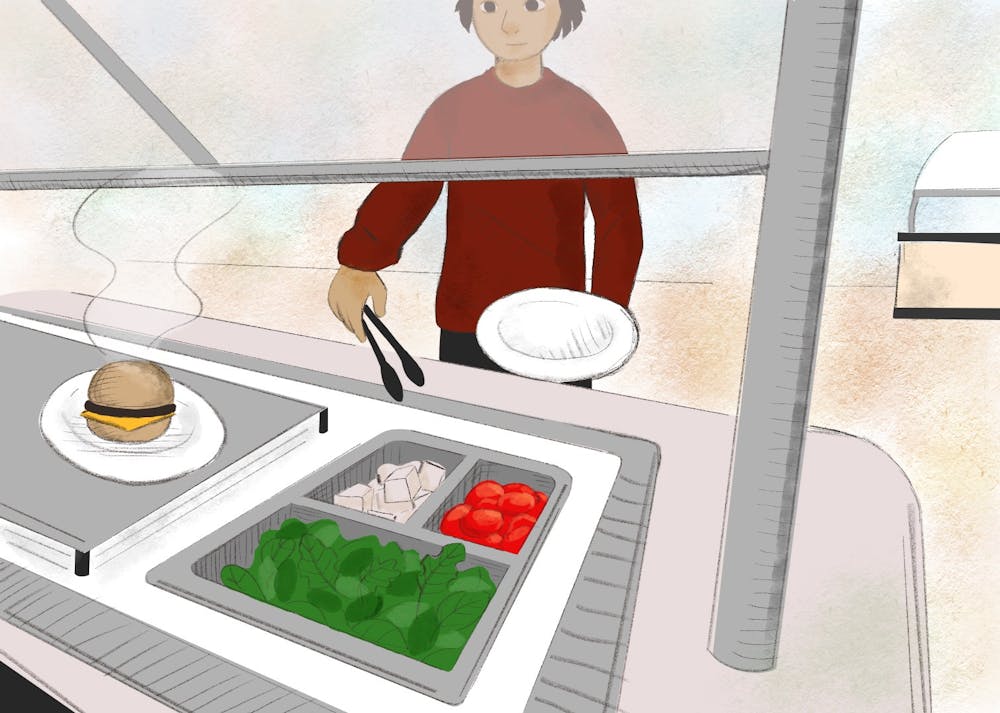With their dietary choice alone, students have more power to influence environmental health than they think. Going plant-based, while difficult, has the opportunity to make a big dent in greenhouse gas levels.
Agriculture is the primary source of methane, a greenhouse gas that has contributed to 30% of global warming since the preindustrial era. Livestock emissions, which includes manure and gastroenteric releases, makes up nearly 32% of all human-related methane gas emissions.
Despite societal shifts towards awareness of one's environmental impact, meat consumption in the United States has nearly doubled, from an average of 50.8 pounds per person annually in 1960 to about 95.2 pounds per person annually in 2019.
Mauricio Bellon, a research professor at ASU's Swette Center for Sustainable Food Systems, said individuals have an opportunity to make an impact on this figure.
"There is a change in the culture where people are recognizing that we need to eat less meat and that also has an impact on the industry," Bellon said. "Your choices as consumers, at the end of the day, drive the systems."
Kathleen Merrigan, the executive director at the Swette Center, agrees with the idea that we, as consumers, have control over the larger meat industry.
Merrigan suggests students "vote with your fork," meaning the dietary choices students make can act as a vote for the future they want to see.
With all of the benefits considered, why are plant-based diets not more widespread? Beyond budgeting issues, people, especially students, worry about its restrictions.
"I don’t want them to think about it as deprivation", Merrigan said.
It is more than just a preference issue; there are many nutrients contained in meat that most do not consider.
Esteve Gaelle Giraud, a research assistant professor also at the Swette Center, was a pescatarian for seven years, and during that time she faced challenges becoming accustomed to her new diet.
"When I stopped eating meat, my main challenge was that I did not know how to have a well-balanced diet without meat," Giraud said. "Over time, people on a plant based-diet tend to lack B12 and omega-3, so it is very important to get supplements."
However, Bellon believes that the key to change is a "diversified diet", where meat is reduced, but not entirely eliminated.
"A diversified diet is where you have lots of different things: lots of plants, as little as possible processed foods, and not too much meat," Bellon said.
Going plant-based, while possible for students on a budget, can be an overwhelming change. To make things easier, Giraud suggests starting slow.
"Start with one meal a day if you eat meat three times a day. Then with one day a week. And make sure to replace with nutritious, healthy food in enough quantity," Giraud said.
Merrigan recommends students do a little research and experiment with friends to create plant based meals that are college student friendly.
"There are a lot of incredibly wonderful and creative, exciting meals that can be put together that are within the budget of a student, and that are entirely plant based," Merrigan said.
For students who dine on campus, the change is even simpler. Katherine Poe, a graduate student studying biology and the president of Veg Out, a student organization focusing on animal rights and veganism, said she found it easy to eat vegan at ASU.
"I lived in ASU dorms for over three years, and ate out of the dining hall for over two of those. I was able to maintain my vegan lifestyle while staying healthy and happy," said Poe. "ASU dining halls label which foods are vegetarian and vegan, and many of the dining halls now have stations that are exclusively vegan."
ASU provides plenty of resources for students to access information about their plant-based options on campus on their website.
"If you're eating in the dining hall, learn how to read the allergen signs denoting which dishes are plant-based, and don’t be afraid to ask staff questions," said Poe.
Although many find it overwhelming to completely alter their diet, it is easier than ever for students to make this change with the resources already within their grasp.
Edited by Annie Graziano, Reagan Priest and Anusha Natarajan.
Reach the reporter at brenna.gauchat@gmail.com and follow @brenngauchat on Twitter.
Like The State Press on Facebook and follow @statepress on Twitter.




